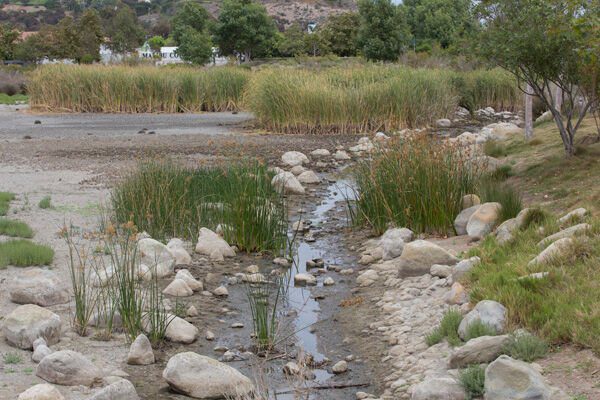City officials are now working on a solution to the dry lake at Legacy Park.
Many Malibu residents are bothered by the fact that the pond at Legacy Park has dried up in the drought, while at the same time a construction project for a new business park and shopping center across the street is unloading tens of thousands of gallons of water that is flowing into their construction site, channeling it into Malibu Creek. (La Paz has a permit for a subterranean parking garage, which crews are now digging out.)
That led Council Member Steve Uhring to the logical question: Why not put some of the water from the La Paz project into the pond across the street? Uhring suggested the solution at the Wednesday, June 23, Malibu Public Works Commission meeting, and brought it up again at a council meeting held on Monday night, June 28.
“If we can do that, I think it makes the park much more enjoyable for everybody, makes it look better, makes the birds happy—a lot of good stuff comes from that,” Uhring said Monday. Other council members agreed.
At the same meeting, City Public Works Director Rob DuBoux said there was another option in the works—using treated sewer water to fill the dry pond.
“We were in the process of actually making the connection from our recycled water line at the treatment plant … to use that water for irrigation,” DuBoux said. According to DuBoux, the project began two-and-a-half years ago.
“We had a hiccup, a little bit, on making that connection on the recycled water,” the director continued, later adding, “I checked with the regional board to make sure what permits and everything we needed to do to make that happen … It’s nothing really that would cause great delay. The regional board will work with us to fast-track … with that, we have options.” That would involve sending the request for the La Paz project to the public works commission to start the bureaucratic process of getting permits for water.
Later in the meeting, though, DuBoux said diverting water from the sewer into the pond was “something we could get started going right away.” DuBoux said the recycled water would be the “quickest way” to get water to the pond. Toward the end of the five-hour council meeting on Monday, interim City Manager Steve McClary told council staff had “sufficient charge in order to move forward on that item.”
The decision to hook up the treated sewer water came after some confusion over permitting the La Paz water.
The executive director of the state water board office in Los Angeles later told KBUU News it would be not a big deal to divert some of that clean water into the pond.
According to the water board’s Renee Purdy, the construction company evaluated using the water constructively, but the city turned them down.
“The discharger indicated that they had evaluated a number of different options as an alternative to discharging the water to Malibu Creek, but that they were unable to find any options. And I did look at the city statement that you provided to us in the email, and it appears that based on the city statement that the city had indicated it doesn’t have the means to use the water at Legacy Park.”
According to DuBoux, the city turned down an initial offer of using the La Paz project’s water because staff believed the project generated too much water for the pond to hold. In addition, there was already the plan—albeit stalled—to route treated water from the sewer into the pond.
“Knowing how much water they were going to be generating out there [at the La Paz project], all that water would have overrun our system and caused us to discharge into Malibu Creek,” DuBoux said at the Monday meeting.
DuBoux told the Malibu Public Works Commission on Wednesday night, June 23, that some permits and studies would have to be submitted to the state water board.
Last Wednesday, DuBoux said a bunch of engineering studies and permits would have to be pulled from not only the water board, but other agencies—not so, said the water board.
“We have looked at the water quality monitoring data that has been collected for the district so far, and of course that discharge is subject to water quality limits before it is discharged to Malibu Creek. And we do know that it is currently meeting all of the water quality standards.”
Emily Sawicki contributed to this report.

